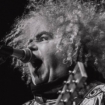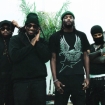Revolver has teamed with Boris on an exclusive vinyl variant of their new album W on "sea blue with black blob" wax. Only 300 copies were made — get yours now!
In 2020, Japanese experimental heavy crew Boris (like many people across the globe) were feeling the stifling weight and emotional strain of the global pandemic. To channel their frustrations, they dropped NO — an aggressive, punky slab of cathartic metal. But that was only one piece of the puzzle.
This January Boris completed their pandemic-inspired project with the release of their new album W, which links with NO "to form NOW, a duo of releases that respond to one another." The haunting, drony, vibey W finds singer-guitarist Wata leading the band, as well listeners, beyond the strife and dissonance of NO to a transformative place of serenity and healing.
"This difficult situation caused great damage to our mind and body," says Wata of 2020's lockdowns, "but sublimating blocked feelings in NO and the process of steadily expanding relaxed songs like the ones in W became our own form of healing."
On W healing takes many forms. Sometimes it's confronting hellacious events through whispers and sublime distortion ("Beyond Good And Evil" addresses the atomic attack on Hiroshima, Wata's hometown); other times it's creating propulsive, avant-garde, ambient dance music ("Drowning By Numbers") or manifesting crushing monoliths of searing guitars and speaker-fried fuzz ("You Will Know (Ohayo Version)).
But at all times (and at all volumes), Boris — which also includes vocalist/bassist Takeshi and vocalist/drummer Atsuo — embrace and embody the heaviness that's been their stock-in-trade since they emerged in the early Nineties. "The word 'heavy' has various forms and meanings,'" Wata tells us. "We've consistently worked on various forms of heavy sounds. I think you'll be able to hear elements that lead to the atmosphere of this album before heavy loud sounds start … and in reverberations."
Ahead of W's January 21st release via Sacred Bones, we caught up with Wata for a chat about the expansive vision behind the band's latest heavy expressions.

IN 2020, YOU RELEASED NO AS A RESPONSE TO THE NEGATIVE ENERGY OF THE PANDEMIC. WHAT HAVE THESE COVID TIMES BEEN LIKE FOR YOU PERSONALLY?
WATA All planned live performances and tours were canceled, but fortunately, we were still able to reserve the studio we always use even during the lockdown. We stayed there and constantly recorded. It was no longer possible to gain heat and power from the live venues and receive feedback for production activities. Instead, we constantly faced and explored new sounds in the studio.
DID YOU DEVELOP ANY NEW CREATIVE ROUTINES OR HOBBIES TO HELP YOU GET THROUGH THE STRESS AND PERIODS OF ISOLATION?
There were things I could no longer do, but because of that situation, I tried new and discovered new things. As a band, we were able to focus on studio work, find methods to connect with listeners worldwide such as through Bandcamp, the band never stopped moving. Maybe we were even busier than pre-COVID. For me, I had more time to immerse myself in my favorite games.
NO AND W ARE COMPANION PIECES, BUT MUCH DIFFERENT SONICALLY. PLEASE TELL US ABOUT THE MUSICAL VISION BEHIND THIS YEAR'S W AND HOW IT RELATES TO NO.
If NO were to display anger and violent emotions, W would be serenity and awakening. Whether it's about the world or ourselves within, conflicting emotions and states constantly co-exist like both pairs of wheels. NO and W together become NOW — by listening to both works, I believe that the conflicting feelings will connect, and you'll be able to feel the world we live in NOW.
TYPICALLY, VOCAL DUTIES ARE SHARED BY THE ENTIRE BAND. WHAT INSPIRED YOU TO SING ALL THE LEAD VOCALS ON W?
In Boris everyone takes on the vocals, but it is the scenery and guided words from the progress of songs that lead the direction on who sings or how they sing, in the process of completing the song. It's a flow that occurs very naturally. NO had an indispensable sound image with intense vocals by Atsuo and Takeshi. In the process of making W, the image of me singing emerged, and the lyrics and arrangements expanded from there. Rather than a vocalist conveying opinions and messages, I see myself more as one of the musical instruments expressing the worldly view.
CAN YOU TALK ABOUT SOME OF W'S LYRICAL THEMES? I KNOW THE SECOND SINGLE "BEYOND GOOD AND EVIL" CONFRONTS THE LEGACY OF THE ATOMIC ATTACK ON HIROSHIMA IN WORLD WAR II.
As mentioned before, serenity is at the root of W, which is the complete opposite of NO. But it's not just "healing" that it represents, but more like an image of knocking on human beings' consciousness to encourage an "awakening." Even in casual scenery and awareness of our everyday lives, there are tremendous possibilities and happiness hidden — those types of thoughts led to the creation of the lyrics.
MUSIC-WISE, HOW WAS W WRITTEN? WERE THESE TRACKS BUILT FROM IMPROVISATIONS?
Yes. W was also completely self-recorded. Atsuo edited the tracks from jam sessions to build the song structures, and Takeshi and I added riffs and melody to them. For this album, we requested Buffalo Daughter's suGar Yoshinaga with the sound production. We'd always liked Buffalo Daughter and we hoped to make something with her one day, so it was great timing. The basics of W were completed by June 2020, and we handed over the sound source to suGar right away. With her post-production, the music evolved more, expanding the worldview of the work to areas far beyond our expectations, and became a wonderful work.
THE DEBUT SINGLE "DROWNING BY NUMBERS" IS A HAUNTING SONG FULL OF DRONING GUITARS AND PROPULSIVE BEATS. CAN YOU DESCRIBE HOW THAT CAME TOGETHER?
We first improvised with drums and guitars for "Drowning By Numbers". With editing, we built the skeletal structure of the song, added bass lines, and overdubbed various instruments. At this point, we still can't see its complete form. We improvised the song's melody over this, and found that the theme of the song was "numbers." By focusing on the theme, we created the words and song, and suGar Yoshinaga added arrangements and post-production. Instead of someone leading the songwriting process, we tilt our ears to listen to the voice of the song itself to understand "how they want to be" and constantly keep changing to reach completion.
"DROWNING BY NUMBERS" PREMIERED WITH AN INTENSE DANCE PERFORMANCE VIDEO. CAN YOU TALK ABOUT THE CONCEPT BEHIND THAT VIDEO AND HOW IT REFLECTS THE MUSIC?
The concept evolved from a collaboration with Kei Miyata, who was originally a founding member of KARAs, a contemporary dance company. We had a 40-minute showcase with dancers dancing to our unreleased sound source. We asked Yukiko Doi, one of the dancers from the showcase, to participate in the production of the "Drowning By Numbers" music video. Even at this showcase, the dancers were dancing with "Drowning By Numbers" playing in the background, and the music video was the extension of that. She has a very wide range of styles — from classical and neoclassical ballet to contemporary dance — and her beautiful physical expression led to the development of ideas for the visuals
"THE FALLEN" HAS A REALLY NICE BUILD-AND-RELEASE STRUCTURE AND A BEAUTIFUL AMPLIFIED MIDDLE SECTION. WHAT DO YOU RECALL ABOUT WRITING IT?
W has a quiet impression overall, but "The Fallen" is one of the peaks within the album. It's an instrumental song that doesn't contain my singing, and it's a song that was completed like a single stroke during our jam session. I think it's our natural way of being to have an album that contains conflicting expressions: in this case, not just serenity but also songs that are loud and heavy.

"YOU WILL KNOW (OHAYO VERSION)" IS A MASSIVE, HEAVY TRACK. WHAT WAS YOUR MAIN GUITAR AND AMPLIFIER FOR CREATING THOSE RIFFS AND RICH DISTORTIONS?
I use the usual Les Paul with the Matamp. I also used the Tape Echo and E-Bow. Takeshi used B.C. Rich Warbeast for the guitar, and Sunn Model-T for the amp. For pedals: Death by audio ROOMS, EarthQuaker Devices Aqueduct, Shiftline Astronaut and Strymon Timeline. He said he emits tremors with things like tremolo arms and delay modulation with Aqueduct and Timeline.
WHAT YOUR PLANS ARE FOR 2022; WILL BORIS BE TOURING AT ALL?
Boris will be welcoming our 30-year anniversary this year. We can't give details yet, but we have various plans prepared. It also depends on what situation we end up in with COVID, but we'd definitely love to pursue live shows and tours.












